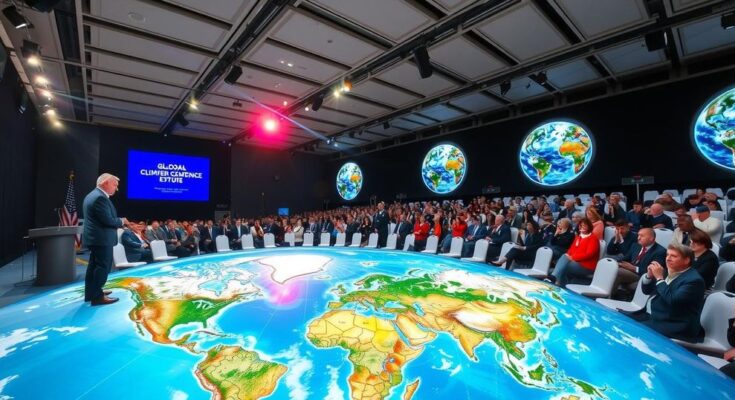The COP29 summit in Baku concluded with minimal commitments amidst rising populism and geopolitical tensions, highlighting the challenges in climate diplomacy. Global climate crises continued to escalate, exemplified by unprecedented heatwaves and natural disasters. Significant leaders’ absences and the retreat of major powers impacted negotiations, while the summit produced some pledges for increased climate finance, although much remains to be done. The future effectiveness of climate diplomacy depends on restoring collaborative efforts and honoring financial commitments to combat climate change.
As the COP29 summit concluded in Baku, Azerbaijan, its outcomes were overshadowed by political strife, lack of commitment, and the alarming rise of populism. The gathering, rather than fostering global solidarity against the climate crisis, devolved into an arena of geopolitical conflicts and populist rhetoric that challenged the very foundations of international climate cooperation. Given the accelerating climate emergency, exemplified by disastrous weather events across continents, COP29’s limited achievements highlight the urgent need for more cohesive and united global responses to climate change.
The urgency of the climate crisis was palpable at COP29, where the planet teeters on the brink of crossing the 1.5°C rise threshold. Amidst raging wildfires in southern Europe and severe droughts in East Africa, Asia faced significant water-related disasters, exacerbated by record-breaking heat waves, such as the scorching 50.5°C recorded in Rajasthan, India. Meanwhile, Latin America grappled with the alarming deforestation of the Amazon and catastrophic floods in Libya, compounding the struggles for urgent climate action.
The specter of populism loomed large over COP29, particularly highlighted by the recent re-election of Donald Trump. His previous administration’s policies against climate internationalism raise concerns about the future of global climate governance, particularly regarding the Paris Agreement. The exit of Argentina’s delegation led by President Javier Milei, who labeled climate change a deceptive narrative, underscores a growing trend of political leaders favoring immediate economic interests over critical environmental action. This trend was further evident in the presence of leaders such as Viktor Orban, who vocally supported fossil fuels, reflecting a broader challenge to climate diplomacy.
Geopolitical tensions further complicated the proceedings at COP29, as evidenced by strained relations between Azerbaijan and France. President Ilham Aliyev’s accusations of colonialism led to France’s climate minister boycotting the summit, while the choice of Baku as a host city raised eyebrows due to Azerbaijan’s dependence on fossil fuel revenues. Additionally, the ongoing rivalry between the United States and China hampered negotiations, as both nations prioritized their national agendas over collaborative climate efforts, thereby stalling essential commitments on climate finance.
Despite these challenges, COP29 did yield some ostensibly positive results. Countries collectively pledged to enhance climate finance for developing nations, with commitments of at least $300 billion annually by 2035. Furthermore, significant players in finance and development banks demonstrated their support for climate action, though these efforts remain outstripped by the demands of the climate crisis. Leaders from Italy and Turkey emerged as surprising advocates, proposing ambitious targets for renewable energy and carbon emissions reduction, yet the overall progress remained insufficient given the scale of necessary action.
Looking ahead, the outcomes of COP29 illuminate the pressing need to reformulate global climate governance. Restoring trust in climate diplomacy will require developed nations to fulfill their financial obligations and emerging economies to engage more positively in the dialogue. The contributions of subnational actors and middle powers also remain vital in ameliorating the leadership void within this critical arena. As the global community anticipates COP30 in Brazil, the responsibility now lies in the hands of world leaders—whether they will rise to the occasion or allow the opportunity for meaningful change to slip away permanently.
The preceding COP29 summit in Baku, Azerbaijan, took place amid a global climate crisis marked by devastating natural disasters and escalating international tensions. Events leading to this summit included notable global heatwaves, droughts, and flooding, which underscored the urgency for climate action. As populist rhetoric and geopolitical rivalries increasingly infiltrate climate diplomacy, the summit highlighted both the significant hurdles and the potential avenues for progress. The interplay of national interests among key players such as the United States, China, and various developing countries posed challenges to collaborative solutions.
COP29 serves as a stark reminder of the fragility of international climate diplomacy in the face of rising populism and geopolitical conflicts. Despite some positive commitments, the outcomes fell short of what is necessary to address the mounting climate crisis effectively. To forge a path forward, global leaders must recommit to substantial climate finance and collaborative action, recognizing that the health of the planet transcends national boundaries. The effectiveness of future climate summits will hinge on the capacity of nations to work collectively amidst increasing divisions.
Original Source: m.thewire.in




